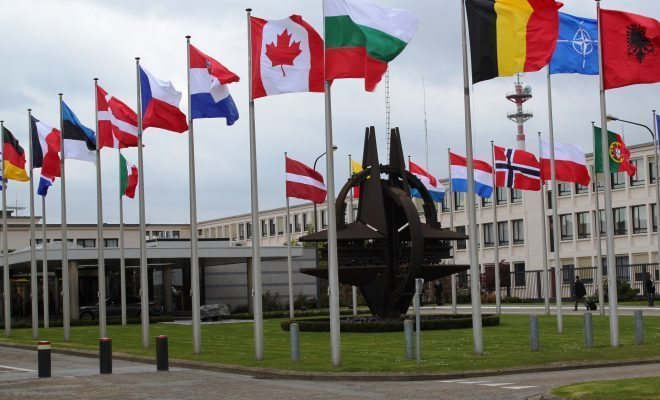 Image Courtesy of [Utenriksdepartementet UD via Flickr]
Image Courtesy of [Utenriksdepartementet UD via Flickr]
World
NATO Summit to Address Russian Aggression, Cyber Threats, and ISIS
On Friday, Poland’s capital city, Warsaw, will host 28 heads of state from Europe and North America at the 2016 North Atlantic Treaty Organization Summit. Ironically, the two-day conference will address some modern realities that parallel the obstacles the trans-Atlantic coalition hoped to eradicate with its founding premise over a half century ago: Soviet (now Russian) deterrence, European nationalism, and political integration.
In a few ways, the world today mirrors that of 1949. Then, the Soviet Union was absorbing states into its Communist sphere and nationalist fervor engulfed a post-World War II Europe. Today, Russia, while recently pledging to cut its military spending, is putting its military might behind Western foes like Syria and continues to foment rebellion in Ukraine. And in the face of terrorist attacks and the disrupting effects of globalization, nationalist, tribal attitudes are gripping all corners of the Western world, as Britain’s exit from the European Union and the rise of Donald Trump in America and far-right movements in Europe demonstrate.
NATO Secretary-General Jens Stoltenberg outlined the bloc’s current threats to The Associated Press: “We live in a more dangerous world, with terrorism, with turmoil, especially to the south of the alliance, in Iraq, Syria, North Africa,” he said. “But also with a Russia which is more assertive, a Russia which has tripled its defense spending since 2000, and which has used force against an independent nation in Europe, Ukraine.” He added that NATO must adapt to a changing world.
NATO was born in 1949 out of a document called the Washington Treaty. Signed by 12 founding nations, the pact promised collective security for all of its members, present and future: “an armed attack against one or more of them in Europe or North America shall be considered an attack against them all,” reads Article 5 of the treaty. The group was founded in the hope of “deterring Soviet expansionism, forbidding the revival of nationalist militarism in Europe through a strong North American presence on the continent, and encouraging European political integration.”
Of utmost importance to Stoltenberg, President Obama, and especially NATO’s Baltic members, is deterring a resurgent Kremlin. At Friday’s conference, member-nations will hammer out the details and give the official go-ahead to four multinational military brigades to be stationed in Poland, Lithuania, Latvia, and Estonia, the Baltic states who face the most pressing threat from Moscow. The nearly 4,000 troop-strong brigades will be led by the U.S., Britain, Canada, and Germany. At a pre-summit media briefing in Brussels, Polish NATO Ambassador Jacek Najder called the multinational effort “the most significant accomplishment of alliance deterrence and defense in decades.”
In a joint press conference with Polish President Andrzej Duda, Stoltenberg ticked off the issues that will be addressed at the upcoming summit meeting. NATO will “step up our response to threats from the south. Boost our support for partners. Increase our resilience against hybrid and cyber threats. And take our cooperation with the European Union to an ambitious new level,” he said.
America’s stance on NATO is far from unanimous. For decades, it has been the alliance’s deepest well of funding, since the amount a member pays is based on its GDP. But if Donald Trump, the presumptive Republican presidential nominee, gets elected in November, that could change. In April, he called NATO “obsolete,” claiming that European members were ripping America off, saying, “we are protecting them and they are getting all sorts of military protection and other things.” But Obama–who traveled to Warsaw on Thursday for his final summit–and Hillary Clinton, Trump’s counterpart on the Democratic side, are in sync on NATO.
In response to Trump’s comments, Obama called the alliance “the lynchpin, the cornerstone, of our collective defense and U.S. security policy.” The former secretary of state gave her two cents as well: “If Mr. Trump gets his way, it will be like Christmas in the Kremlin,” she said. “It will make America less safe and the world more dangerous.”








Comments